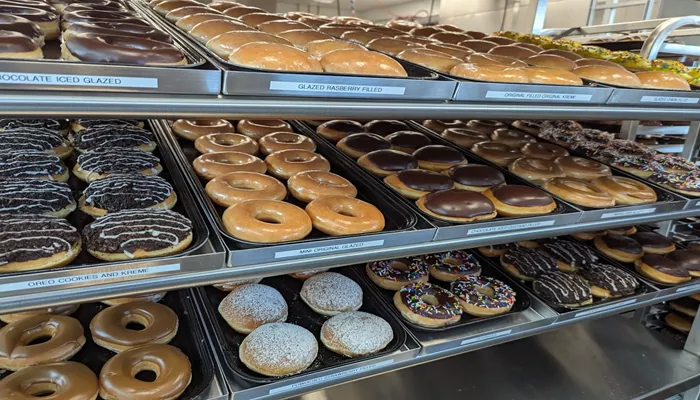Krispy Kreme, renowned for its delicious doughnuts and iconic Hot Light, is a significant player in the doughnut industry. Known for its “Original Glazed” doughnuts and a range of flavors, Krispy Kreme operates on a high-volume basis, with a constant influx of fresh doughnuts. Given the scale of their operations, managing leftover doughnuts is a crucial aspect of their business. This article delves into the methods Krispy Kreme employs to handle leftover doughnuts, ensuring sustainability and community support.
Commitment to Freshness
Krispy Kreme is dedicated to serving freshly made doughnuts, which is why they aim to produce doughnuts that are sold quickly. Typically, doughnuts are made throughout the day, and any unsold items are removed from the sales floor to ensure customers receive only the freshest products. This proactive approach minimizes the occurrence of leftover doughnuts.
Disposal and Waste Management
When leftover doughnuts do occur, Krispy Kreme has specific protocols for their disposal. The company follows stringent waste management practices to handle unsold doughnuts responsibly. Unsold doughnuts are typically discarded according to local regulations. In many locations, leftover doughnuts are collected and disposed of in ways that comply with environmental standards. This often includes sending them to waste management facilities where they are either composted or disposed of properly.
Donations to Charitable Organizations
One of the most impactful ways Krispy Kreme deals with leftover doughnuts is through donations. Krispy Kreme has a robust program in place to donate unsold doughnuts to charitable organizations. These donations are typically made to local shelters, food banks, and community organizations that support individuals in need.
Partnerships with Nonprofits
Krispy Kreme partners with various nonprofit organizations to distribute leftover doughnuts. These partnerships are crucial in ensuring that leftover doughnuts reach those who can benefit from them. The company often collaborates with local charities and community groups to identify the best recipients for their donations.
Employee Benefits
In addition to donating leftover doughnuts, Krispy Kreme sometimes offers them to employees. This practice not only helps reduce waste but also provides a benefit to staff members. Employees can enjoy fresh doughnuts as part of their workplace culture, which contributes to overall job satisfaction.
Recycling and Composting Programs
In regions where recycling and composting programs are available, Krispy Kreme participates in these initiatives. Doughnuts that cannot be donated are often sent to composting facilities where they are broken down into organic matter. This process helps reduce the environmental impact of waste and supports sustainable practices.
Community Involvement and Transparency
Krispy Kreme’s approach to managing leftover doughnuts reflects its commitment to community involvement and transparency. The company’s efforts to donate and recycle demonstrate a responsibility toward reducing waste and supporting those in need. Krispy Kreme’s community engagement efforts include regular updates and transparency about their waste management practices, which helps build trust and shows their dedication to social responsibility.
Innovations in Waste Reduction
Krispy Kreme continually explores new ways to minimize waste and improve their operations. Innovations in production and distribution are often aimed at reducing the amount of leftover doughnuts. For example, advancements in inventory management and forecasting can help better align production with demand, thereby reducing the likelihood of excess doughnuts.
see also: Krispy Kreme Franchise Requirements: All You Need to Know
Impact on Local Communities
The donation of leftover doughnuts has a significant positive impact on local communities. By providing fresh doughnuts to shelters and food banks, Krispy Kreme contributes to the well-being of those who may not otherwise have access to such treats. This practice not only supports individuals in need but also strengthens the company’s ties with local communities.
Educational Programs and Workshops
Krispy Kreme occasionally engages in educational programs and workshops related to waste management and sustainability. These initiatives aim to raise awareness about the importance of reducing waste and implementing effective waste management practices. By educating both employees and the public, Krispy Kreme helps promote a culture of sustainability.
Future Goals and Sustainability Initiatives
Looking forward, Krispy Kreme continues to set goals for improving its sustainability practices. The company is likely to expand its efforts in waste reduction and explore additional methods for managing leftover doughnuts. Future initiatives may include increased focus on recycling, enhanced partnerships with nonprofits, and further innovations in production processes.
Conclusion
Krispy Kreme’s approach to handling leftover doughnuts showcases its commitment to freshness, sustainability, and community support. Through donations, recycling programs, and employee benefits, the company effectively manages leftover doughnuts while contributing positively to society. Krispy Kreme’s practices not only minimize waste but also support those in need, reinforcing the company’s role as a socially responsible business. As Krispy Kreme continues to evolve, its focus on sustainability and community involvement will likely remain central to its operations, demonstrating a dedication to both quality and responsibility.

